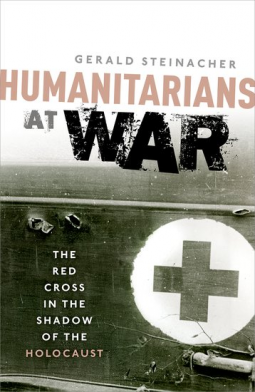
Humanitarians at War
The Red Cross in the Shadow of the Holocaust
by Gerald Steinacher
This title was previously available on NetGalley and is now archived.
Buy on Amazon
Buy on BN.com
Buy on Bookshop.org
*This page contains affiliate links, so we may earn a small commission when you make a purchase through links on our site at no additional cost to you.
Send NetGalley books directly to your Kindle or Kindle app
1
To read on a Kindle or Kindle app, please add kindle@netgalley.com as an approved email address to receive files in your Amazon account. Click here for step-by-step instructions.
2
Also find your Kindle email address within your Amazon account, and enter it here.
Pub Date May 15 2017 | Archive Date May 01 2017
Description
The Geneva-based International Committee of the Red Cross (ICRC) is one of the world's oldest, most prominent, and revered aid organizations. But at the end of World War II things could not have looked more different. Under fire for its failure to speak out against the Holocaust or to extend substantial assistance to Jews trapped in Nazi camps across Europe, the ICRC desperately needed to salvage its reputation in order to remain relevant in the post-war world. Indeed, the whole future of Switzerland's humanitarian flagship looked to hang in the balance at this time.
Torn between defending Swiss neutrality and battling Communist critics in the early Cold War, the Red Cross leadership in Geneva emerged from the world war with a new commitment to protecting civilians caught in the crossfire of conflict. Yet they did so while interfering with Allied de-nazification efforts in Germany and elsewhere, and coming to the defense of former Nazis at the Nuremberg Trials. Not least, they provided the tools for many of Hitler's former henchmen, notorious figures such as Joseph Mengele and Adolf Eichmann, to slip out of Europe and escape prosecution-behavior which did little to silence those critics in the Allied powers who unfavorably compared the 'shabby' neutrality of the Swiss with the 'good neutrality' of the Swedes, their eager rivals for leadership in international humanitarian initiatives.
However, in spite of all this, by the end of the decade, the ICRC had emerged intact from its moment of existential crisis, navigating the new global order to reaffirm its leadership in world humanitarian affairs against the challenge of the Swedes, and playing a formative role in rewriting the rules of war in the Geneva Conventions of 1949. This uncompromising new history tells the remarkable and intriguing story of how the ICRC achieved this - trying to escape the shadow of its ambiguous wartime record to forge a new role and a new identity in the post-1945 world.
Torn between defending Swiss neutrality and battling Communist critics in the early Cold War, the Red Cross leadership in Geneva emerged from the world war with a new commitment to protecting civilians caught in the crossfire of conflict. Yet they did so while interfering with Allied de-nazification efforts in Germany and elsewhere, and coming to the defense of former Nazis at the Nuremberg Trials. Not least, they provided the tools for many of Hitler's former henchmen, notorious figures such as Joseph Mengele and Adolf Eichmann, to slip out of Europe and escape prosecution-behavior which did little to silence those critics in the Allied powers who unfavorably compared the 'shabby' neutrality of the Swiss with the 'good neutrality' of the Swedes, their eager rivals for leadership in international humanitarian initiatives.
However, in spite of all this, by the end of the decade, the ICRC had emerged intact from its moment of existential crisis, navigating the new global order to reaffirm its leadership in world humanitarian affairs against the challenge of the Swedes, and playing a formative role in rewriting the rules of war in the Geneva Conventions of 1949. This uncompromising new history tells the remarkable and intriguing story of how the ICRC achieved this - trying to escape the shadow of its ambiguous wartime record to forge a new role and a new identity in the post-1945 world.
Available Editions
| EDITION | Other Format |
| ISBN | 9780198704935 |
| PRICE | $32.95 (USD) |
| PAGES | 352 |



